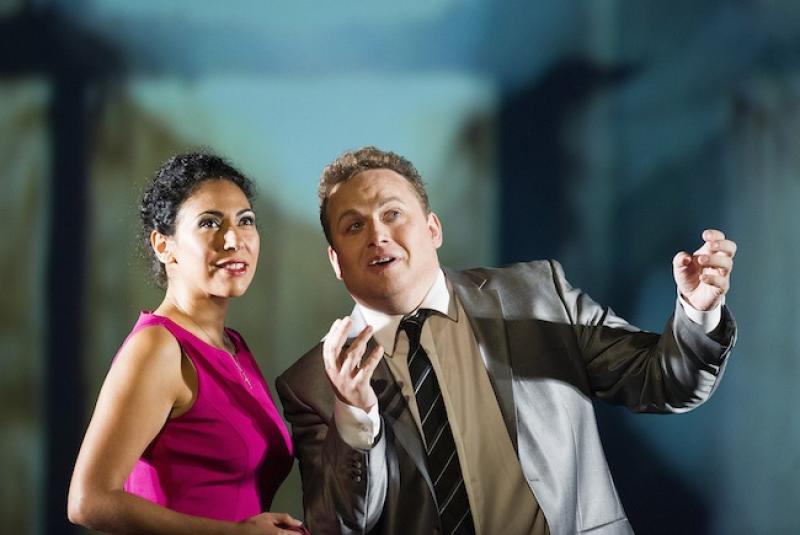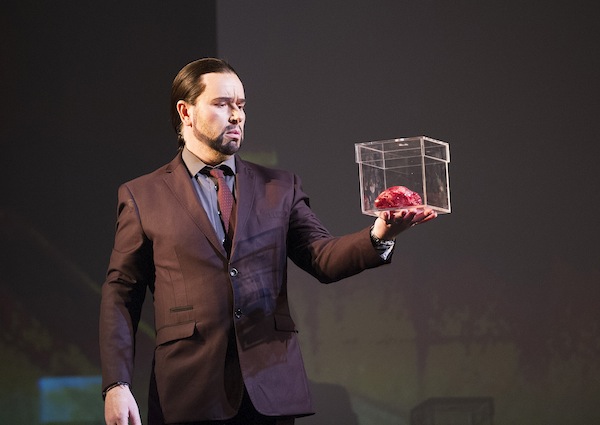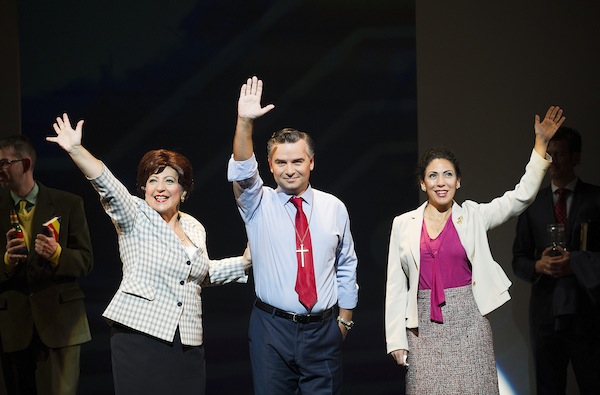Faust, Opera North | reviews, news & interviews
Faust, Opera North
Faust, Opera North
Classy vocal performances battle it out with spectacular visuals

You leave Opera North’s new Faust buzzing and bleary-eyed. The production sounds glorious, with terrific singing. It’s also blessed and cursed with a visually astonishing staging which thrills only slightly more than it infuriates. This company’s cheeky Carmen update annoyed many in 2011, and their take on "the second most popular French opera" will leave some spectators perplexed.
Ran Arthur Braun and Rob Kearley’s updating is broadly contemporary but full of anachronistic details – the chorus could pass for Mad Men extras, though gazing at iPads and occasionally filming proceedings on their smart phones. At the opera’s outset, Peter Auty’s Faust resembles little more than a burnt-out, middle-aged executive – eye-catching, morphing computer graphics hinting at his scientific achievements. His cerebral career hasn’t left him much time for fleshly pleasures; his suicide threats cue the entrance of James Creswell’s scene-stealing Méphistophélès (pictured below), a sharply dressed, ponytailed charmer who appears to be channelling Robert de Niro’s Louis Cyphre from the film Angel Heart.
 When Méphistophélès takes possession of Faust’s soul, he physically removes the heart – a deliciously repellent moment, made more repulsive by his coyly placing the bloody object into a small perspex box. Faust’s rejuvenation is neatly achieved through cosmetic surgery – though, apart from removing his glasses, he seems remarkably unchanged. And there’s this production’s biggest problem – Auty thereafter remains an inoffensive chap in a grey suit, still charisma-deficient and rarely seeming heroic. Which is such a shame, as Auty’s voice is one of this production’s glories, his lyrical high register never showing signs of strain.
When Méphistophélès takes possession of Faust’s soul, he physically removes the heart – a deliciously repellent moment, made more repulsive by his coyly placing the bloody object into a small perspex box. Faust’s rejuvenation is neatly achieved through cosmetic surgery – though, apart from removing his glasses, he seems remarkably unchanged. And there’s this production’s biggest problem – Auty thereafter remains an inoffensive chap in a grey suit, still charisma-deficient and rarely seeming heroic. Which is such a shame, as Auty’s voice is one of this production’s glories, his lyrical high register never showing signs of strain.
Video artist Lillevan’s projections soon establish themselves as the production’s dominant element, enabling Ran Arthur Braun’s austere set to be transformed in seconds. White screens slide from left to right - a wonderful, practical device, but on more than one occasion I was worried that Auty’s Faust would be bloodily bisected after failing to dodge one. White cubes, reminiscent of a Tate installation, fulfil ingenious multiple roles, among them jewel boxes, giant dice and podiums. Lillevan’s visual effects are frequently stunning – the casino imagery in Act 2 after Méphistophélès sings of the value of money is eye-popping, as is the stark, white abortion clinic at the opening of Act 4. There’s a brilliant, tiny moment in the Jewel Song where Juanita Lascarro’s Marguerite gazes at herself, briefly spotlit by the flash of paparazzi cameras. Lascarro is physically and vocally perfect for the role. You can imagine exactly why a depressive 50-something male would go off the rails in pursuit.
 Gounod’s chorus of soldiers and villagers are depicted as supporters of Marcin Bronikowski’s Valentin (pictured left), who resembles a Republican US presidential candidate. This has some darkly comic potential, notably the crowd defending themselves against Méphistophélès using bibles and beer bottles held in the shape of the cross, although seeing the same chorus members holding anti-abortion placards at the start of Act 4 feels forced and uncomfortable. As with so many Opera North productions, the chorus is consistently magnificent, particularly in the brief unaccompanied prayer heard soon after Valentin’s death. Stuart Stratford’s conducting makes Gounod’s music sound rich, profound and defiantly unfrothy. There are no weak links in the supporting roles – Robert Anthony Gardiner and Sarah Pring are excellent as Siébel and Marthe. Marvel at the visual effects and lighting, Wince at the final image, and breathe a sigh of relief as the house lights come on.
Gounod’s chorus of soldiers and villagers are depicted as supporters of Marcin Bronikowski’s Valentin (pictured left), who resembles a Republican US presidential candidate. This has some darkly comic potential, notably the crowd defending themselves against Méphistophélès using bibles and beer bottles held in the shape of the cross, although seeing the same chorus members holding anti-abortion placards at the start of Act 4 feels forced and uncomfortable. As with so many Opera North productions, the chorus is consistently magnificent, particularly in the brief unaccompanied prayer heard soon after Valentin’s death. Stuart Stratford’s conducting makes Gounod’s music sound rich, profound and defiantly unfrothy. There are no weak links in the supporting roles – Robert Anthony Gardiner and Sarah Pring are excellent as Siébel and Marthe. Marvel at the visual effects and lighting, Wince at the final image, and breathe a sigh of relief as the house lights come on.
rating
Explore topics
Share this article
Add comment
The future of Arts Journalism
You can stop theartsdesk.com closing!
We urgently need financing to survive. Our fundraising drive has thus far raised £49,000 but we need to reach £100,000 or we will be forced to close. Please contribute here: https://gofund.me/c3f6033d
And if you can forward this information to anyone who might assist, we’d be grateful.

Subscribe to theartsdesk.com
Thank you for continuing to read our work on theartsdesk.com. For unlimited access to every article in its entirety, including our archive of more than 15,000 pieces, we're asking for £5 per month or £40 per year. We feel it's a very good deal, and hope you do too.
To take a subscription now simply click here.
And if you're looking for that extra gift for a friend or family member, why not treat them to a theartsdesk.com gift subscription?
more Opera
 Albert Herring, English National Opera review - a great comedy with depths fully realised
Britten’s delight was never made for the Coliseum, but it works on its first outing there
Albert Herring, English National Opera review - a great comedy with depths fully realised
Britten’s delight was never made for the Coliseum, but it works on its first outing there
 Carmen, English National Opera review - not quite dangerous
Hopes for Niamh O’Sullivan only partly fulfilled, though much good singing throughout
Carmen, English National Opera review - not quite dangerous
Hopes for Niamh O’Sullivan only partly fulfilled, though much good singing throughout
 Giustino, Linbury Theatre review - a stylish account of a slight opera
Gods, mortals and monsters do battle in Handel's charming drama
Giustino, Linbury Theatre review - a stylish account of a slight opera
Gods, mortals and monsters do battle in Handel's charming drama
 Susanna, Opera North review - hybrid staging of a Handel oratorio
Dance and signing complement outstanding singing in a story of virtue rewarded
Susanna, Opera North review - hybrid staging of a Handel oratorio
Dance and signing complement outstanding singing in a story of virtue rewarded
 Ariodante, Opéra Garnier, Paris review - a blast of Baroque beauty
A near-perfect night at the opera
Ariodante, Opéra Garnier, Paris review - a blast of Baroque beauty
A near-perfect night at the opera
 Cinderella/La Cenerentola, English National Opera review - the truth behind the tinsel
Appealing performances cut through hyperactive stagecraft
Cinderella/La Cenerentola, English National Opera review - the truth behind the tinsel
Appealing performances cut through hyperactive stagecraft
 Tosca, Royal Opera review - Ailyn Pérez steps in as the most vivid of divas
Jakub Hrůša’s multicoloured Puccini last night found a soprano to match
Tosca, Royal Opera review - Ailyn Pérez steps in as the most vivid of divas
Jakub Hrůša’s multicoloured Puccini last night found a soprano to match
 Tosca, Welsh National Opera review - a great company reduced to brilliance
The old warhorse made special by the basics
Tosca, Welsh National Opera review - a great company reduced to brilliance
The old warhorse made special by the basics
 BBC Proms: The Marriage of Figaro, Glyndebourne Festival review - merriment and menace
Strong Proms transfer for a robust and affecting show
BBC Proms: The Marriage of Figaro, Glyndebourne Festival review - merriment and menace
Strong Proms transfer for a robust and affecting show
 BBC Proms: Suor Angelica, LSO, Pappano review - earthly passion, heavenly grief
A Sister to remember blesses Puccini's convent tragedy
BBC Proms: Suor Angelica, LSO, Pappano review - earthly passion, heavenly grief
A Sister to remember blesses Puccini's convent tragedy
 Orpheus and Eurydice, Opera Queensland/SCO, Edinburgh International Festival 2025 review - dazzling, but distracting
Eye-popping acrobatics don’t always assist in Gluck’s quest for operatic truth
Orpheus and Eurydice, Opera Queensland/SCO, Edinburgh International Festival 2025 review - dazzling, but distracting
Eye-popping acrobatics don’t always assist in Gluck’s quest for operatic truth
 MARS, Irish National Opera review - silly space oddity with fun stretches
Cast, orchestra and production give Jennifer Walshe’s bold collage their all
MARS, Irish National Opera review - silly space oddity with fun stretches
Cast, orchestra and production give Jennifer Walshe’s bold collage their all

Comments
Hang on - a male singing
How much did Opera North pay
Having seen productions of
Actually I found the